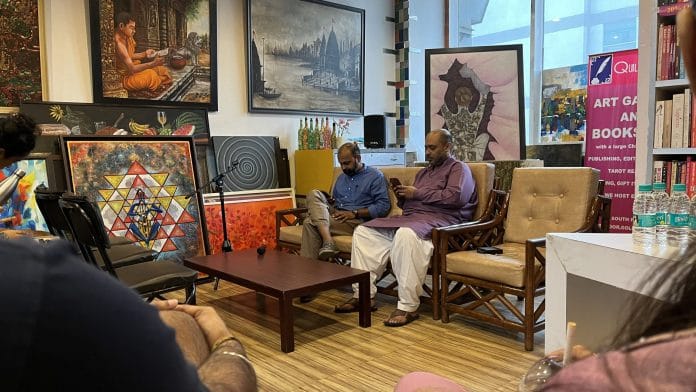New Delhi: A book discussion on architect-turned-historian Aabhas Maldahiyar’s Babur: The Chessboard King reaffirmed the mystique that continues to surround the first Mughal emperor, while also serving as a hefty reminder. Just as beauty is in the eye of the beholder, history is too. Maldahiyar’s Babur is a savage, weakened ruler, bogged down by repeated failed conquests.
“I had learnt Akbar unified India. There’s a certain group of people who say Akbar unified the country,” he said to a small group of people gathered in Gurugram’s Quill and Canvas bookstore on 21 June. “When I became objective and began to read history, I found things were completely different.”
The result is The Chessboard King, a takedown of the founder of the Mughal empire.
In Maldahiyar’s book, Babur’s fundamental flaw is his incompetence. He is a dreadful administrator, an unwise economist, and a disastrous military commander—which is why he has been named “the chessboard king”. In the game, not only does the king not have much power, he also lacks the ability to manoeuvre.
Unlike Stephen Frederic Dale’s Babur (in Timurid Prince and Mughal Empire), whose life is built on traumas and triumphs, love, loss and longing for his homeland, Maldahiyar’s warlord is a barbarian. He was purely the custodian of Timur and his “unfinished agenda”.
“Psychologically, he hated India and Indians,” said Abhijit Iyer-Mitra, with whom Maldahiyar was in conversation. Mitra describes himself as the ‘Orry of intellectuals’ and the book as “an overwhelmingly negative portrayal” of the Mughal emperor.
Babur’s Baburi
The discussion tapered into other Mughal emperors as well as their popular perceptions — how they are portrayed in school textbooks and viewed in mainstream cinema. Oddly enough, what also formed a significant portion of the discussion was Babur’s sexual orientation.
He had both—wives and infatuations. In the Baburnama, he writes of his infatuation with a fourteen-year-old boy, Baburi.
“I visit her only once a month because I don’t like to. But I am madly in love with a boy,” said Malhadiyar, claiming that this is a verse from the Baburnama.
Iyer attempted to frame this in a cookie-cutter version of today’s Islam, when homosexuality is blasphemous. But in the 16th century, his desire for men was far more acceptable. In a podcast episode with Maldahiyar and YouTuber Abhijit Chavda, Babur is dubbed an “LGBTQ icon.”
For certain members of the audience, the discussion was an eye-opener.
“Why have we not been able to change our history textbooks? We had 10 years of a strong government,” asked one of them. Maldahiyar and Mitra responded by suggesting that perhaps this was the incorrect forum.
“We don’t have a BJP spokesperson here,” said Mitra.
Rewriting history
Maldahiyar calls himself a ‘reformed Marxist’. The architect and urban designer’s previous book is titled #ModiAgain: Why Modi is right for India, An Ex-Communist’s Manifesto. According to him, communism is responsible for various evils, one of which is the way history has been recorded. However, this was now being undone by virtue of books like his Chessboard King.
“They [Marxists] are the representatives of Muslims. Any criticism of Muslim historical figures is seen as an attack on Islam itself. This is cultural marxism,” he said. “Indian Muslims don’t realise that by associating with them, they are associating with people who plundered and destroyed the nation.”
In his reading of history, Mughal Islam was not reasonably syncretic, but repressive. “How can we celebrate Ganga-Jamuni tehzeeb?” was one of Maldahiyar’s parting questions. But he acknowledged Babur’s lone saving grace. “He wrote “brilliant poetry.”
(Edited by Prashant)






